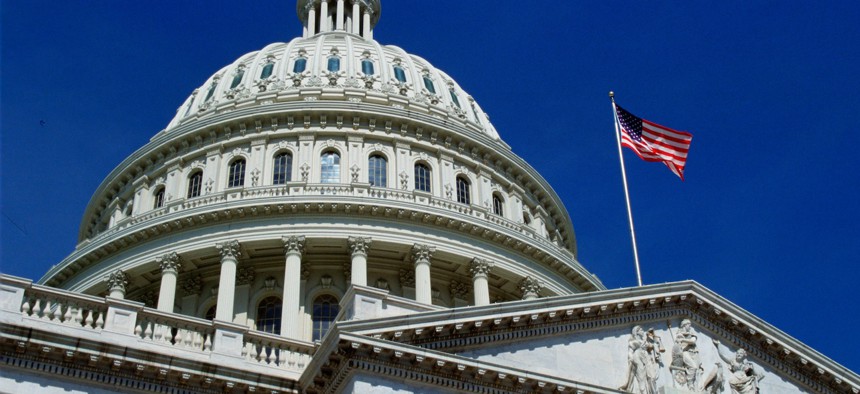
If Congress failed to act, more than 600,000 federal employees would have faced furloughs while 780,000 would have remained on the job and potentially faced delayed paychecks. Tim Graham/Getty Images
Senate misses deadline but averts shutdown after passing $1.2T funding package
Appropriations technically expired but shutdown procedures never commenced, with all agencies now funded through September.
Updated March 23 at 2:03 a.m.
The Senate approved a $1.2 trillion spending package early Saturday shortly after a portion of the government was set to shut down, staving off the threat for the remainder of fiscal 2024.
The upper chamber moved to approve the measure after funding had lapsed, though shutdown procedures never commenced because an agreement was imminent. President Biden’s was expected to quickly sign the measure, which the House passed on Friday. The spending bill includes funding for the remaining parts of government that have not yet received full-year appropriations, including the departments of Defense, Treasury, Homeland Security, Labor, Health and Human Services, Education and State.
The House took up the bill first on Friday after it was introduced early Thursday morning, neglecting its usual procedure of allowing 72 hours of review before a vote is held on any bill. The package won broad, bipartisan support, though far more Republicans opposed it due to the rushed nature of its consideration and spending levels they deemed too high.
It then moved to the Senate, which required cooperation from every senator to pass the bill on an expedited timeline. Several Republicans demanded amendment votes on the package in exchange for the hastened schedule and leaders struggled to come up with a plan acceptable to all parties. Earlier in the day, the timing remained uncertain and Senate Majority Leader Chuck Schumer, D-N.Y., implored his colleagues to avoid a funding lapse.
“Democrats and Republicans have about 13 hours to work together to make sure the government stays open,” Schumer said Friday morning, asking lawmakers to avoid even a short, weekend shutdown. “There is no reason to delay. There is no reason to drag out this process.”
He did not strike a final agreement with Republicans until just before the midnight deadline, meaning the final votes did not occur until after funding lapsed. The White House, however, directed agencies not to shut down.
The Office of Management and Budget “has ceased shutdown preparations because there is a high degree of confidence that Congress will imminently pass the relevant appropriations and the President will sign the bill on Saturday,” the White House said. “Because obligations of federal funds are incurred and tracked on a daily basis, agencies will not shut down and may continue their normal operations."
The measure keeps overall non-defense discretionary spending flat while bumping slightly defense spending, though some domestic agencies will endure modest cuts. If Congress had failed to act by Friday night, more than 600,000 federal employees would have faced furloughs while 780,000 would have remained on the job and potentially face delayed paychecks.
If the Senate had failed to act, shutdown impacts would have been minimal. If it had dragged into Monday, however, when the vast majority of impacted federal employees would otherwise report to work, agencies would have been forced to initiate their funding lapse plans.
Members of both parties hailed the agreement for its boosts to the Pentagon and the resources it will provide to border security agencies. Republicans cheered that it achieved slight cuts on an overall basis to non-defense, non-Veterans Affairs Department discretionary spending, while Democrats celebrated that the final package was largely free of the conservative policy riders and drastic cuts to domestic agencies Republicans had initially demanded. Some Democratic priority areas, such as early childhood education, some international programs and pay bump for Transportation Security Administration employees, were fully funded.
“We said from the very beginning that if we all work together in a reasonable, bipartisan way, we can fund the government responsibly,” Sens. Patty Murray, D-Wash., and Susan Collins, R-Maine, who serve as the chair and ranking members of the Senate Appropriations Committee, respectively, said in a joint statement.
Ahead of Friday’s vote, Murray noted that agencies are receiving their full-year funding dollars with the fiscal year already halfway over. She requested Congress move more quickly in fiscal 2025, with the top-line funding level already agreed to as part of a two-year budget deal Biden previously struck with House Republicans.
“We should not teeter on the verge of shutdown, and lurch from one CR to another,” Murray said. “Agencies should not be dedicating so many resources to preparing again and again for a possible government shutdown.”







